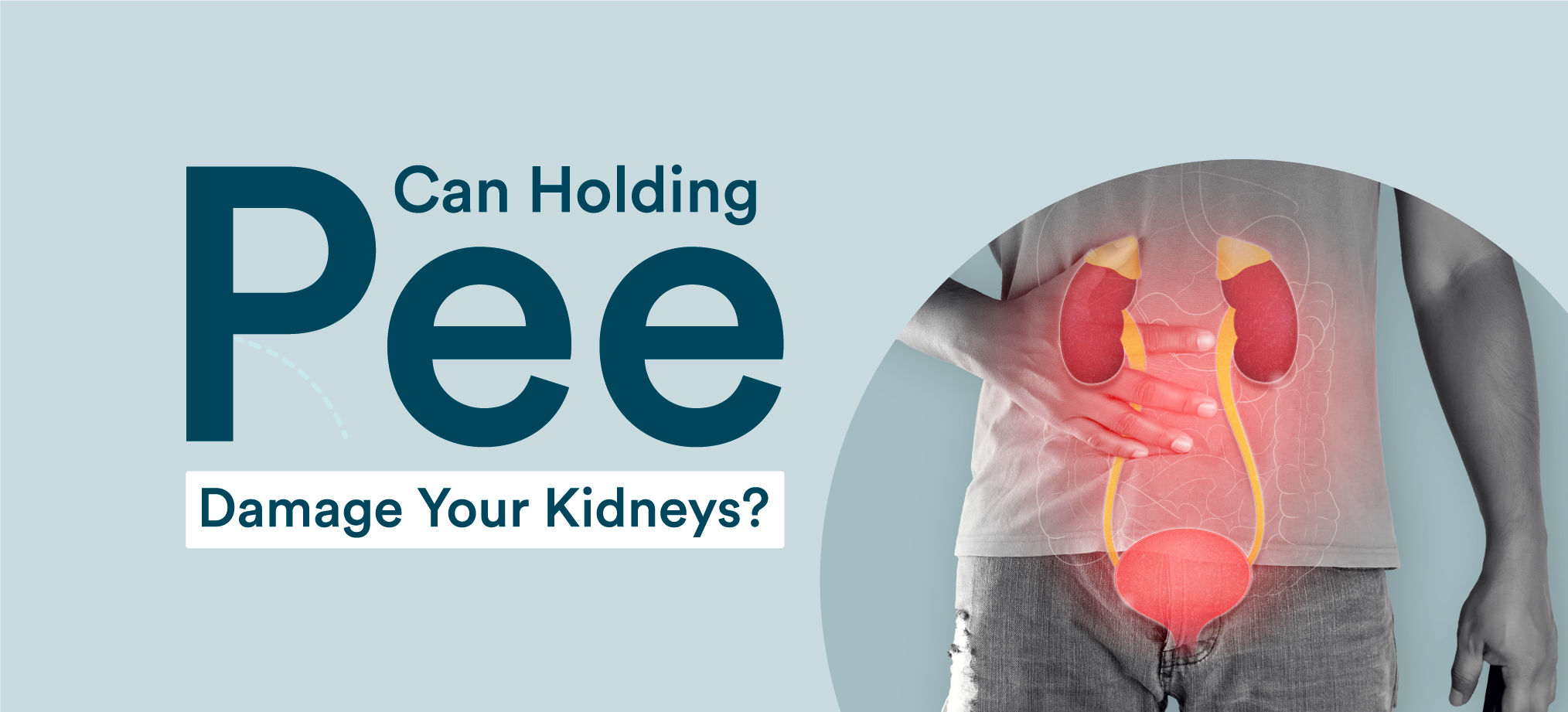General Health
Why You Should Never Hold Your Pee?
6 min read
By Apollo 24|7, Published on - 31 January 2023, Updated on - 09 June 2023
Share this article
0
16 likes

It's human nature to occasionally encounter a predicament where we convince ourselves that we don't need to relieve ourselves. One possible reason is to keep people from relieving themselves in unclean public places. Even if we desire to keep working or have just woken up from a nap, it's easy to fall into a state of extreme lethargy. But there are a few good reasons why we shouldn't hold it in.
What Happens When We Hold Our Pee?
When you try to hold your pee in, the muscles in your bladder will contract, which will cause pressure to be applied to the walls of your bladder. This may not only be uncomfortable or painful, but it may also result in an infection of the urinary system.
When you go and relieve yourself, it may be more difficult to completely empty your bladder because the muscles in your bladder will become weaker as a result of your habit of holding in urine for extended periods. This can happen if you routinely hold in urine for lengthy periods. When you feel the need to urinate, it is generally recommended that you go to the restroom to relieve yourself.
According to Dr Debmalya Gangopadhyay, a urologist associated with Apollo 24|7, “the Human brain has designated areas which make you aware of the socially acceptable time and place to relieve yourself and save you from embarrassment. However, holding back pee for a long time repeatedly may be detrimental for your kidneys and urinary system. Prolonged postponement of voiding not only makes your urinary bladder muscles weak, it also invites infection and ailments like stone formation. The back pressure created by your urinary bladder also somewhat stagnates urine upstream in certain individuals, especially in the elderly and diabetics, whose kidneys are already under stress, leading to gradual weakening of their function. Not only pressure transmissions, the infection from bladder may rise up to the kidneys leading to further damage. Thus, using the facilities in unacceptable circumstances may not be desirable to us, but holding your pee back regularly and repeatedly may cost you more.”
Holding Urine and Its Health Risks
1. Kidney Damage
When done for extended periods, holding in pee can have many detrimental impacts on one's health, most notably on the kidneys and the urinary system. When pee is held in for an extended period, the pressure inside the bladder can rise, which increases the risk of developing infections in the urinary tract and kidneys as well as damage to the urinary tract or kidneys.
It is imperative that you relieve yourself of urine as soon as you feel the urge to do so, rather than holding it in for extended periods, as this can cause serious health complications.
Symptoms: Fatigue, Loss of appetite, nausea or vomiting, difficulty sleeping, swelling (legs, ankles, and feet), itchy skin, dark or foamy urine, pain in the back or side, below the ribs, and high blood pressure.
2. Bladder Dysfunction
When a person suppresses their urine for extended periods, they run the risk of developing bladder dysfunction. For the bladder to be emptied, the muscles that make up the bladder are intended to contract and then relax. The muscles in the bladder are retained in a constricted condition for longer than normal when urine is held in, which can cause them to stretch and become weaker over time. This happens when urine is held in. Incontinence often described as a loss of control over one's bladder, may result from this condition.
Symptoms: Frequent urination, weak stream, straining, dysuria (discomfort when urinating), intermittency (starting and stopping while urinating), and sudden urge to pee.
3. Urinary Tract Infection
Urine retention for extended amounts of time can raise the likelihood of acquiring a urinary tract infection (UTI). This is because germs can accumulate in the bladder if it is not emptied regularly, which in turn raises the likelihood of an infection occurring.
When you hold in urine, the pressure in the bladder increases, which can push bacteria into the urethra, the tube that carries urine out of the body. If the bacteria can make it to the bladder, they will begin to grow, which will result in an infection.
Symptoms: Burning when urinating, urgent need to urinate, frequent urination, cloudy or strange-smelling urine, lower abdominal pain or pressure, and fatigue.
4. Bladder and Kidney Stones
Urine retention for long periods might raise the likelihood of developing bladder and kidney stones. Urine retention can also cause kidney stones. When urine is stored for an excessive amount of time in either the bladder or the kidneys, it can become concentrated, which can cause the minerals present in the urine to crystallise. These crystals, given enough time, have the potential to mature into stones.
When passing through the urinary tract, these stones are known to be extremely painful and uncomfortable, and they also carry the risk of causing infections and other issues. In addition, if the stones become stuck in the urinary tract, they have the potential to obstruct the flow of urine and cause injury to the kidneys. This can lead to further complications. It is essential to empty your bladder regularly to prevent stones from forming in either your kidneys or your bladder.
Symptoms of Bladder Stones: Lower abdominal or back pain, frequent, painful, and bloody urination.
Symptoms of Kidney Stones: Severe discomfort below the ribs, nausea, vomiting, and blood in the urine. Cloudy, strong-smelling urine and difficulty peeing are other signs. (In some cases, there may be no symptoms at all)
5. Pelvic Problems
The pelvic floor muscles, which are responsible for maintaining the bladder, colon, and uterus, can become weakened when an individual holds their pee for an extended time. Over time, the muscles that support the pelvic floor might atrophy, which can result in pelvic organ prolapse. This condition causes pelvic organs such as the bladder, uterus, or rectum to slip down into the vagina.
Symptoms: Urinary incontinence, faecal incontinence, pelvic pressure, pain in the lower back, Pain during sexual activity, or vaginal or rectal prolapse.
💡 Did You Know?
It takes the average human body 9-10 hours to create 2 cups of urine. That's the maximum amount of time you can wait before risking serious damage to your internal organs.
Take Away: When to Consult a Doctor?
Urinating whenever you feel the need to is generally seen to be beneficial. Chronic urinary retention is associated with an increased risk of urinary tract infections, as well as damage to the urinary bladder and kidneys as mentioned above.
The length of time a person can hold their urine varies from person to person based on factors like their hydration level, fluid intake, and general health. Most healthy persons can retain their urine for 4-8 hours, however, doing so should be done rarely.
If you are experiencing pain or discomfort while retaining pee, or if you find that you can't hold it for the usual amount of time, you should see your doctor.
General Health
Leave Comment
Recommended for you

General Health
Chickenpox In Adults: Symptoms, Treatment, Vaccination
Learn about chickenpox in adults: Discover symptoms, risk factors, treatment options, and the importance of vaccination for prevention.

General Health
Colorectal Cancer: Risk Factors and Prevention
Learn about the risk factors and prevention strategies for colorectal cancer. Discover the latest guidelines, technologies, and lifestyle factors to protect yourself from this deadly disease.

General Health
What Causes Nightmares?
Nightmares are particularly common in people with Post Traumatic Stress Disorder (PTSD), who have experienced traumas in life or were serving in military war zones.
Subscribe
Sign up for our free Health Library Daily Newsletter
Get doctor-approved health tips, news, and more.
Visual Stories

The Best Exercises for Controlling Blood Sugar Levels
Tap to continue exploring
Recommended for you

General Health
Chickenpox In Adults: Symptoms, Treatment, Vaccination
Learn about chickenpox in adults: Discover symptoms, risk factors, treatment options, and the importance of vaccination for prevention.

General Health
Colorectal Cancer: Risk Factors and Prevention
Learn about the risk factors and prevention strategies for colorectal cancer. Discover the latest guidelines, technologies, and lifestyle factors to protect yourself from this deadly disease.

General Health
What Causes Nightmares?
Nightmares are particularly common in people with Post Traumatic Stress Disorder (PTSD), who have experienced traumas in life or were serving in military war zones.